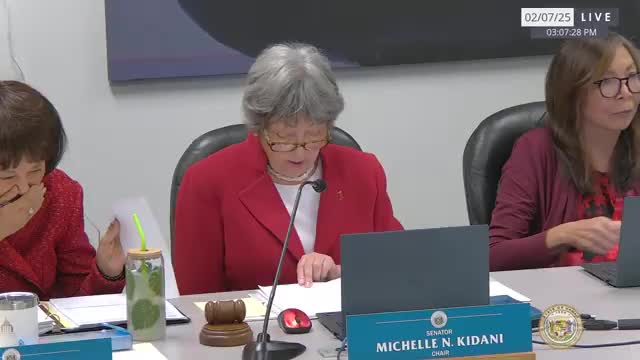Senate committees advance bill to establish Braille literacy policy and resource center
Get AI-powered insights, summaries, and transcripts
Subscribe
Summary
Senate committees on Education and Health and Human Services voted to pass SB530 with amendments to make Braille literacy state policy, require braille-capable literacy assessments for eligible students, authorize administrative rules, establish a Braille Literacy Resource Center and include an appropriation (approx. $300,000) for implementation.
Senate committees on Education and Health and Human Services voted Friday to pass Senate Bill 530, which would establish Braille literacy as state policy, require braille-inclusive literacy assessments for eligible blind and low-vision students, authorize the Department of Education to adopt administrative rules, create a Braille Literacy Resource Center and appropriate funds for implementation. The committees passed the measure with amendments and included the Attorney General’s suggested language in the committee report.
Supporters told the committees the bill aims to address gaps in services for students who are blind or have low vision. Marie Poudhos, who testified in person and said she lost her vision in young adulthood, described the consequences of not having early access to braille. “When we use braille … the tactile representation of our language provides our ability to form the structure of our language, which then leads to literacy,” she said. “This bill isn’t for me. The system already failed me. But for our kids now … if we can get Braille instruction at the right time … they will become more proficient.”
Heidi Armstrong, the Department of Education superintendent, and Gavin Avey, testifying for the Department of Human Services on behalf of Director Ryan Yamane, each said their agencies stand on written testimony in support. Anne Horichi of the Department of the Attorney General cautioned that mandating yearly assessments could conflict with federal special-education procedures where assessment frequency is determined by an IEP team; the AG submitted suggested revisions to subsections the department had proposed. James Gashel of the National Federation of the Blind told the committee his organization “stands on our written testimony” and thanked lawmakers and department staff for their work on the bill.
Committee discussion also addressed funding. During floor discussion, lawmakers referenced an approximate implementation price tag of $300,000 and said that figure will be added to the community report. The Education committee adopted an amendment list and voted to pass the bill with amendments; Health and Human Services adopted the same recommendation.
The measure now moves to the next stage of the legislative process with the committees’ amendments and the Attorney General’s suggested language included in the committees’ report. Implementation details — such as the exact appropriation line item and the Department’s rulemaking timetable — were not specified in the hearing record.
Votes and outcome: The committees' recommendations to pass SB530 with amendments were adopted. Recorded yes votes in the Education committee during the hearing included Chair Kidani (aye), Vice Chair Kim (aye), Senator Asuna Hashimoto (aye), Senator Kurihara (aye) and Senator DeCort (aye). Health and Human Services moved the same recommendation and the committee adopted it; the official committee report will record the formal roll calls and any excused members.
Why this matters: The bill changes statewide policy language and requires braille be considered in literacy assessments for eligible students. Advocates said the change could expand access to early braille instruction and resources for children who are blind or have low vision, while the Attorney General’s input highlights tension between statutory mandates and individualized IEP-based assessment schedules.
